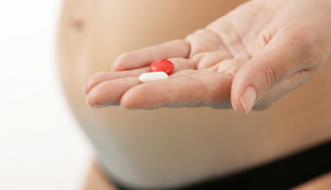![]()
 Even if you don’t typically take vitamins every day, chances are that once you found out you were pregnant, your doctor advised you to look for a good prenatal vitamin. If you’re healthy and active, it’s likely you’re wondering why you need to boost your system. If you’re a busy working woman with a full plate of responsibilities, it can be challenging to take in through diet alone all of the nutrients that you and your baby will need during the term of your pregnancy. This is true even if you’re religious about your diet and eat a healthy, broad range of foods that includes all of the categories found on the food pyramid—meat, dairy, fruits, vegetables, grains and legumes. Even if you’re just thinking about getting pregnant, taking a prenatal vitamin is a great way to get your body prepped for the journey you’ll be taking.
Even if you don’t typically take vitamins every day, chances are that once you found out you were pregnant, your doctor advised you to look for a good prenatal vitamin. If you’re healthy and active, it’s likely you’re wondering why you need to boost your system. If you’re a busy working woman with a full plate of responsibilities, it can be challenging to take in through diet alone all of the nutrients that you and your baby will need during the term of your pregnancy. This is true even if you’re religious about your diet and eat a healthy, broad range of foods that includes all of the categories found on the food pyramid—meat, dairy, fruits, vegetables, grains and legumes. Even if you’re just thinking about getting pregnant, taking a prenatal vitamin is a great way to get your body prepped for the journey you’ll be taking.
If you have dietary restrictions, follow a certain diet or have health issues or pregnancy complications, a prenatal vitamin can be part of your support system when your goal is to be happy and healthy. Women, who are vegetarians or vegans, are lactose-intolerant or have other food intolerances, smoke, or are having twins or multiples should definitely look for the prenatal vitamin offered by reputed companies such as The Honest Company as they will help them maintain good nutrition levels during the pregnancy stage.
If you’re a foodie and know your nutrition, you’re probably aware of the two crucial nutrients you need: folic acid and iron. These are always included in the best prenatal vitamins, because the truth is, most pregnant women don’t get enough of them from their daily food sources alone.
Folic Acid
Folic acid helps to repair and make DNA as well as produce red blood cells, according to Healthline. Citrus fruits and dark green vegetables are good sources. Taking this B vitamin can reduce your baby’s risk of neural tube defects such as spina bifida and anencephaly by 50 to 70 percent. Folic acid may also reduce the risk of other defects, such as cleft lip, cleft palate and certain heart defects. For you, taking folic acid may lower your risk of preeclampsia. Folic acid may also reduce the risk of autism, according to a report in the Journal of the American Medical Association. For dosage, anywhere between 400 mcg and 800 mcg is considered ideal.
Did you know that your body absorbs the synthetic version of folic acid better than the natural one found in food? So even if you eat a balanced diet, a supplement is recommended. Also, people tend to lack a lot of vitamins and minerals due to depleted soils, according to Fox News.
Iron
Iron is one mineral that many moms-to-be don’t get enough of in their daily diet, and not getting enough of it during pregnancy can lead to iron-deficiency anemia. When you have anemia your blood doesn’t have enough healthy red blood cells to carry oxygen to your tissues and to your baby. It’s important to get enough iron to reduce your risk of preterm delivery, low birth weight and infant mortality. As your blood volume almost doubles to deliver oxygen and nutrients to your baby, getting more iron is especially important. Anemia can leave you feeling tired and weak, so do the sensible thing and make sure you take a supplement.
Calcium
As your baby grows and develops, she will need calcium for strong bones and strong teeth,and that calcium comes from you! Calcium is also essential for blood to clot quickly, for muscles and nerves to function properly and for the heart to beat normally. For this reason you need to ensure you’re getting enough calcium so that you remain strong. The recommendation is 250 mg a day.
Magnesium
Another mineral that’s crucial for your baby’s bone development is magnesium. Working in tandem with calcium, magnesium relaxes muscles while calcium stimulates them. It also helps regulate insulin and blood sugar levels, relaxes you, and will also help you with any muscle aches and energy lulls.
Vitamin D
During the latter half of pregnancy, when the baby’s bone growth and ossification are most prominent, the need for vitamin D increases. Unless you eat cod liver oil and herring frequently, chances are you should look for a supplement that includes this nutrient.
Benefits of Prenatal Vitamins
If you’re dealing with morning sickness and the cravings that can come with pregnancy, you might find it hard to eat healthy. Know that even the best prenatal vitaminscan’t make up for a deficient diet, but they can certainly complement it. Knowing that you’re taking one will make you feel better when you’re having a tough morning or just binged on a pint of Ben & Jerry’s for dinner. Remember, prenatal vitamins are designed for the special needs of women who are trying to conceive or who are pregnant.
